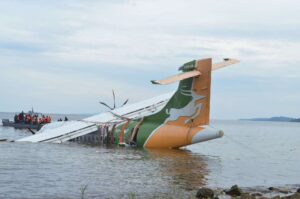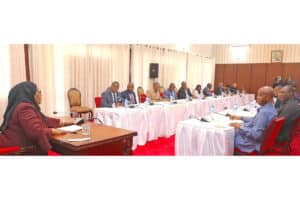Des Moines — Consult Communities, Restore Social Services in Ngorongoro Conservation Area
Tanzania‘s government is forcibly relocating Indigenous Maasai residents from their homes and ancestral lands in the Ngorongoro Conservation Area (NCA), Human Rights Watch said in a report released today. Before further relocations are planned or carried out, the Tanzanian authorities should restore essential public services and consult affected communities to seek their free, prior, and informed consent.
The 86-page report, “It’s Like Killing Culture,” documents the Tanzanian government program that began in 2022 to relocate over 82,000 people from the NCA to Msomera village, about 600 kilometers away, to use their land for conservation and tourism purposes. Since 2021, the authorities have significantly reduced the availability and accessibility of essential public services, including schools and health centers. This downsizing of infrastructure and services, coupled with limiting access to cultural sites and grazing areas and a ban on growing crops, has made life increasingly difficult for residents, forcing many to relocate.
“The Maasai are being forcibly evicted under the guise of voluntary relocation,” said Juliana Nnoko, senior researcher on women and land at Human Rights Watch. “The Tanzanian government should halt these relocations and respect the rights of Indigenous people and rural communities by ensuring their participation in decisions affecting their rights and livelihoods through genuine consultation, access to information, and consent of Indigenous groups.”
The NCA, a United Nations Educational, Scientific and Cultural Organization World Heritage Site is managed by the Ngorongoro Conservation Area Authority (NCAA), a government entity. The area has been home to the Maasai for generations.
The government has not sought the free, prior, and informed consent of the Indigenous Maasai residents in the area about the government’s resettlement plan, Human Rights Watch found. The residents did not have access to information on matters related to the relocation process, compensation, what conditions to expect in Msomera, and which villagers had registered for relocation. By disregarding its obligations, the government raises serious concerns about the prospects for accountability, justice, and remedies required under international, regional, and national law.
Human Rights Watch interviewed nearly 100 people between August 2022 and December 2023, including current residents in the conservation area, former residents now in Msomera village, and Msomera residents who had already been living there. They described violations of their rights to land, education, health, and compensation and attacks on critics of the relocation process.
“No [government] leader has come to listen to the citizens of Ngorongoro to know what their problems are,” said a village council member in the NCA. The lack of consultation has prevented meaningful engagement and exacerbated the harm to residents in both locales.
The authorities have instituted new rules that restrict movement in and out of the conservation area. Since 2022, the NCAA security personnel have arbitrarily required residents to show various types of identification to verify their place of residence and permit entry, even if that resident is known to the guard. Guards deny residents entry or force them to pay a relatively costly tourist fee to enter if they do not have the specific type of identification demanded.
The authorities have denied entry to nongovernmental organizations or followed and monitored their representatives who have been permitted access. Authorities have also imposed increasingly exorbitant entry fees for local groups: an annual fee in 2022, a vehicle fee per entry in 2023, and a per person and per vehicle fee for each entry in 2024.
These actions make it difficult for local groups to continue supporting the Maasai communities in the area and make it increasingly hard for residents to get information and other support.
Residents told Human Rights Watch that the relationship between conservation authority’s rangers, who guard entry points and other areas in the NCA, and community members has deteriorated dramatically since the government began the relocation program. Rangers have attacked, beaten, and harassed residents if they do not comply with the government’s rules. Human Rights Watch documented 13 incidents of beatings by rangers between September 2022 and July 2023.
The government’s relocation and resettlement processes have reinforced gender inequality, Human Rights Watch said. The head of the household, usually a man, registers the family for relocation. During the relocation, the government destroys the family’s homestead, leaving any relatives, including wives, who opted to stay behind, homeless and dependent on extended family. Human Rights Watch identified several women who were not involved in registering, refused to move with their husbands, and were left homeless.
Failure to consult has resulted in the government providing a single three-room house for each resettled Maasai head of household, which does not reflect the needs or complexities of their large, polygamous, multi-generational, and multi-household families.
The authorities have also displaced Msomera residents to resettle families relocated from the conservation area, labelling Msomera resident as “trespassers” and “squatters” and threatening them with arrest and eviction if they protest or talk to the media.
Those who speak out against the relocation, including NCA and Msomera residents and human rights defenders, have faced threats and intimidation from rangers and security forces, creating a climate of fear. “You’re not allowed to say anything,” one Msomera resident said, adding that people have “fear in their hearts.”
The Tanzanian government’s relocation process violates rights protected by national, regional, and international law and standards, including the African Charter on Human and Peoples’ Rights, the International Covenant on Economic, Social and Cultural Rights, the International Covenant on Civil and Political Rights, and the UN Declaration on the Rights of Indigenous People. The forced evictions constitute gross violations of a range of internationally recognized human rights, including to adequate housing, food, water, health, education, work, security of the person, freedom from cruel, inhuman, and degrading treatment, and freedom of movement.
“The Tanzanian government’s need to respect the rights of Indigenous Maasai communities is an ethical obligation as well as a legal one,” Nnoko said. “The government should urgently reconsider its approach to ensure the survival, well-being, and dignity of the Maasai people, which this relocation process is putting at grave risk.”
Additional Quotes:
A village chairperson in the conservation area said:
The government is starting to make us not function at all. They try to weaken us in all means of life. To despair, not to fight, give up and move out. They are trying to make sure that pastoralism comes to an end. We never chase the wild animals to move out. We are very good conservators; we don’t hate the wildlife.
That was not a consultation because [prime minister] just spoke and went. There was nothing like taking people’s views and concerns…. The prime minister visited the area; many people went, but they were refused [permission] to enter. He just selected a few people–ward and village officers–and he just said what he thought and went away.
We do not know anything about Msomera. What we have heard is that people have lost their livestock. How do we make sure the government guarantees that in two to five years if resettled residents lose all their livestock, they will get it replaced, receive compensation, or support? How can the community make sure the government provides these assurances if we have no information?
I can’t compare Endulen [Hospital] now to before. Before, the government provided support plus paid for some hospital staff. Before, Endulen had the mother and childcare services with enough medicines. Now, the government has cut off all support; they have taken their doctors back into government hospitals.
Every resident is feeling the pain. If you fall sick you think of the huge cost you will incur to search for health services. The poorer people are much more vulnerable because they don’t have money to travel far, and the local dispensaries do not have medicines. You can sell livestock and access these services. The other option is to use local traditional herbs or pray to god for a miracle.
He was just walking, and they just punished him. They made him kneel – kichura [toad style], and they punished him using a stick. He got injuries on his legs. We don’t have anywhere to report. You go to the same police who have beaten the guy, so you can’t get any aid. There are many cases like this. Rangers are like people who are above the law.
I was born here. My grandfather was born here…. We are a family of about 72 with grandparents, wives, children [today]. There is not enough land to feed everyone in our family. Now, we depend solely on our cows, which we keep far away from here because there is no place to pasture.
Source: allafrica.com














